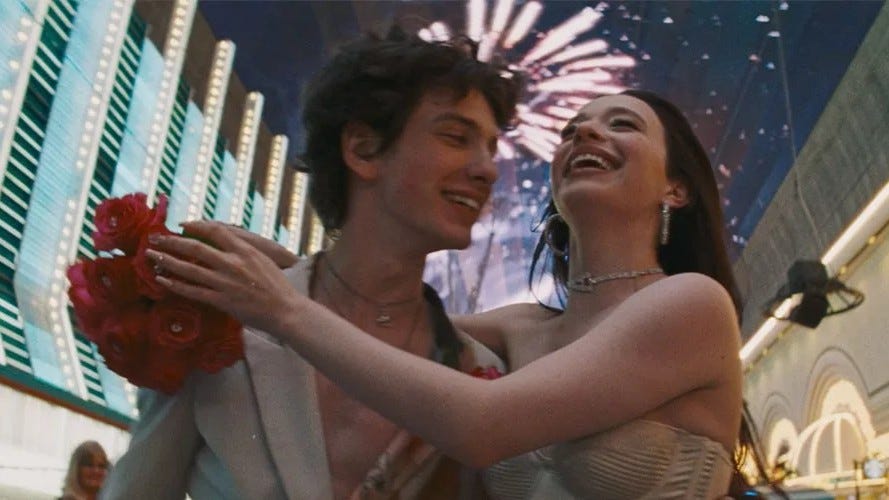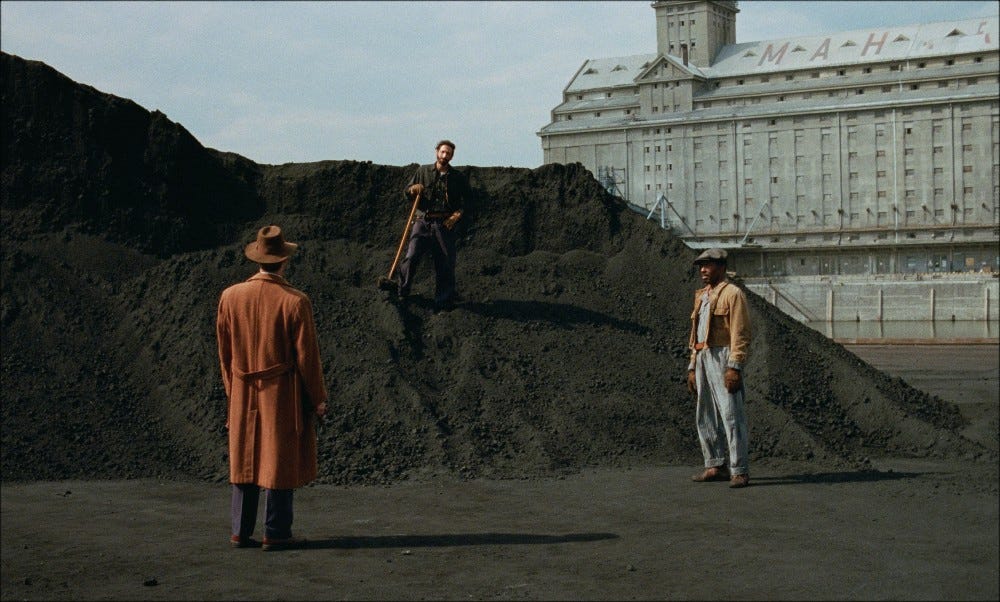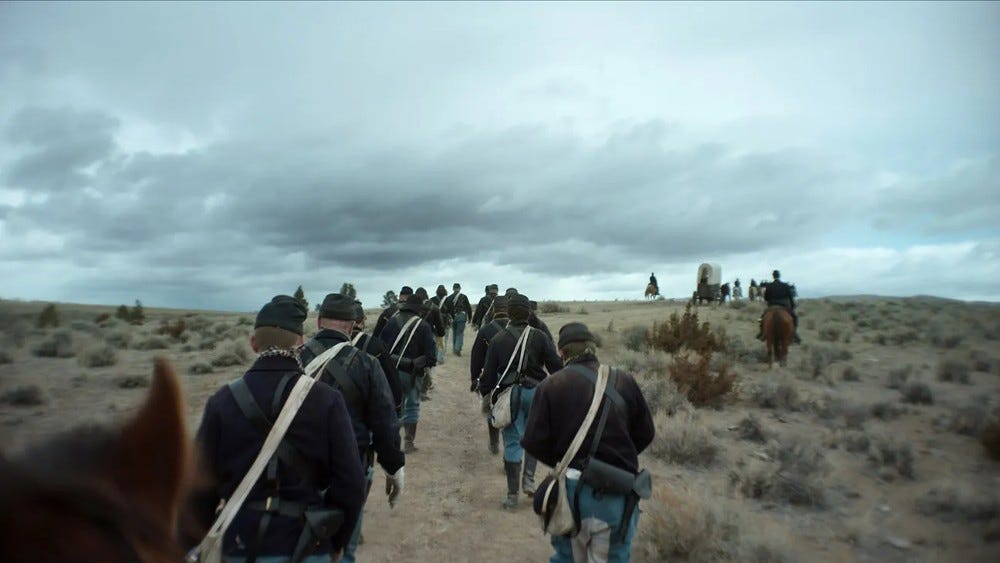Some Reviews from the 62nd New York Film Festival
Anora, The Brutalist, Emilia Perez, Pavements, Hard Truths, The Seed of a Sacred Fig, and More
You may or may not have noticed that I haven’t had a Weekend Warrior column for the past couple weeks and barely any reviews on this Substack, but there are many reasons for that. The first one is that I just need to have a certain amount of time to watch movies and write about them, which I just haven’t had.
The other bigger reason is that the 62nd New York Film Festival began last weekend, and though I haven’t attended that many press screenings, that’s picked up this past week to the point where I spent most of my Wednesday at Lincoln Center whereas normally, I might be using that day to write about some of the theatrical releases this weekend. And that’s the other thing. I need to have time to watch screeners of these movies and being out of town for most of last weekend made that difficult. I was really hoping this column could be fairly thorough in terms of the movies I’m covering, and hopefully that’ll return to normal soon.
I decide to forgo another week of theatrical reviews, having not had a chance to see Joker: Folie à Deux until Friday, so instead, I’m focusing on some of the films I’ve seen at the 62nd New York Film Festival. For the most part, I felt like I was catching up from other festivals that I wasn’t able to attend, like Cannes back in May and TIFF last month.
As of now, the best thing I’ve seen at this year’s New York Film Festival is already a movie that’s received raves and accolades out of other festivals, and that was Sean Baker’s Anora, which very much follows along the lines of previous movies like Tangerine and Red Rocket, but it’s also head and shoulders above anything that Baker has directed before. I was suitably impressed despite being a bit nervous about the amount of hype that’s surrounded the film since it debuted at the Cannes Film Festival and won the coveted Palme d’Or. Going over past Palme d’Or winners, there are many that went on to win Oscars, most notably Bong Joon-ho’s Parasite, but I’ve rarely liked many of them as much as other critics with Titane being a perfect example of that.
This is a very different movie that puts the focus on the title character played by Mikey Madison, who apparently appeared in Quentin Tarantino’s Once Upon a Time in Hollywood and the 2022 Scream requel, although I can’t remember her from either. Anora aka “Ani” is a stripper at a club in Brighton Beach where she encounters Mark Eydelshteyn’s Vanya, a younger and quite brash young Russian man who pays for a lap dance and then convinces Ani to pay him a private visit at his father’s mission. Once there, Vanya is smitten and Ani loves the attention and the easy money, so she agrees to be Vanya’s “girlfriend” for a week, which leads to them getting married in Vegas. When Vanya’s Russian parents, his father a wealthy oligarch, find out, they send Vanya’s caretaker Toros (a fantastic performance by Armenian actor Karren Karagulian) to deal with it. That leads to a night of Ani, Toros and Toros’ goons racing around Brooklyn trying to find Vanya when he runs off.
It’s hard to put into words why Anora works as well as it does, but it’s a movie that’s warm and funny and romantic and sexy and just so effin’ entertaining that you’re pulled into this world and two and a half hours go by in a snap, because you’re so invested in the romance between Vanya and Ani (which has been compared quite correctly to Pretty Woman), and Madison is especially terrific in the role, just exuding so much personality as well as a ton of F-words.
As I said, Anora is next level for Baker, and I fully expect him to get four Oscar nominations, for writing, producing, directing and editing this movie. After seeing it, I’m fully buying into the hype that this could be a bonafide Best Picture contender, as well.
After that, my next favorite movie at this year’s festival is Brady Corbet’s The Brutalist, starring Adrien Brody as Hungarian-Jewish architect László Tóth who is trying to make a living for himself as an immigrant in the era post-WWII, as he’s hired by a wealthy Pennsylvania millionaire Harrison Van Buren (Guy Pearce) to design a new recreation center. László struggles with trying to make it in America, also having a bit of a chip on his shoulder, because he was a huge deal as an architect in Hungary, but his new benefactor, despite his support for László, may also be somewhat (or fully) anti-Semitic.
The Brutalist is 3 and a half hours long, and it’s being shown in 70mm for certain screenings, which looks great, really showing off the film’s fine crafts, but Corbet graciously built an intermission (and an overture) into the prints, to help create the illusion of an old-style Hollywood epic, ala Spartacus or Lawrnce of an Arabia. It’s something that makes seeing the movie more of an event, which is probably why there have been many critics left out of press screenings both in New York and Toronto.
The second half of the movie is when Felicity Jones shows up as László’s ailing wife, and the entire dynamic of the film changes, but there’s also a massive, possibly unexpected, turn in the relationship between Toth and Van Buren that really threw me for a loop just when I thought I knew where the whole thing was going.
As with Anora, The Brutalist is a huge step up in the filmmaking skills of Corbet, to the point where I wonder whether he might be able to get into the Oscar as a writer and director as well as the film getting a Best Picture nomination. It seems to be playing well in the festival circuit with many critics being turned away from packed 70mm screenings, so maybe that can translate into box office.
Alex Ross Perry’s Pavements is his pseudo-doc about the popular ‘90s indie band Pavement, which he made concurrently with writing and directing a Pavement musical called “Slanted! Enchanted!” and directing a biopic called “Range Life”-- which may or may not be a real movie. I haven’t figured out that part yet. Those are all in conjunction with the band’s 2022 reunion for a world tour that also had a special Pavement museum set up in New York City. I didn’t bother with Pavement’s Kings Theater residency in Brooklyn, nor did I see the musical or even know about the museum or biopic, so Perry’s doc does a great job not only filling in viewers on who and what Pavement is about, but also capturing them on their reunion that year. I was a little puzzled by some of the things documented in Perry’s film, since I wasn’t sure that “Range Life” was a real thing – it’s not – but the filmmaker’s dedication to this band he loves so much to create these very different homages to them, makes it quite a love letter to the band, who I’ve always been rather mixed on. Pavements is quite an entertaining movie if you know nothing about Pavement or are their second-biggest fan after Perry. (I have to give extra props to Perry since he kept my pal Olive in the movie!)
Mike Leigh’s latest, Hard Truths, is very different from his last few movies, returning to modern-day “kitchen dramas,” essentially following a British family and showing its dynamics. It’s led by Oscar nominee Marianne Jean-Baptiste (Secrets and Lies), who plays Pansy, the most cantankerous and angry woman on the face of the planet. Her poor husband Curtley (David Webber) barely says a word as he’s being mercilessly berated by his angry wife, similar to their quiet son Moses (Tuwaine Barrett), but Pansy’s sister, a hair stylist with two bubbly daughters, tries her best to calm Pansy down when she gets herself worked up.
I love a good kvetch as much as the next Jew, and Pansy’s constant rants and sniping at everyone she encounters was pretty amusing, at first. As we learn more about the darker aspect of those personality traits, Hard Truths drifts away from being anything like a comedy and becomes more like the family drama we might expect from Leigh. Still, I quite enjoyed seeing Leigh get back to simpler storytelling, even as Pansy almost seems the polar opposite of Sally Hawkins’ overtly-positive character in Happy-Go-Lucky.
I’m not sure how many other actors in this cast, besides Jean-Baptiste, have worked with Leigh before, but he brings back all his regular department heads, including cinematographer Dick Pope and production designer Susie Davies. The real standout is the score by Gary Yershon, which does so much to keeps the shifting tone of the film more stable and consistent. I’m not sure where this falls among Leigh’s amazing filmography, but I probably like it more than some of his movies and less than others. (For instance, I was more impressed with his historic epic, Peterloo, than I was Mr. Turner, despite that film’s great performance by Tim Spall.)
I’ve been a fan of filmmaker Jacques Audiard for over two decades, so I was particularly eager to see his latest movie, Emilia Pérez, which has been receiving lots of buzz going back to Sundance. It’s a strange crime-drama-musical starring Zoe Saldana as Mexican lawyer Rita, who is called upon by a cartel druglord, Manitos (Spanish trans actor Karla Sofía Gascón) to help “him” get a sex change, mainly so that he can escape Mexico before being killed by vengeful rivals. The druglord also sends his wife Jessi (Selena Gomez) and their two boys to Switzerland for their own protection as he fakes his own death. Five years later, Rita runs into an “Emilia Perez” in London and soon realizes that it’s Manitos, the two women returning to Mexico where Emilia becomes an activist helping to find the bodies of many that she may have been responsible for killing. Oh, yeah, and did we mention this is a musical?
This is yet another classic case of a movie being overhyped out of Cannes, and unlike Anora, this one doesn’t fully stand up to the hype. While I love musicals and even unconventional ones – Lars von Trier’s Dancer in the Dark is one of my favorite movies of all time – the biggest problem with this one is that a.) the songs aren’t that catchy or memorable and b.) other than Gomez, the actors just don’t have great singing voices. That alone makes this a failure as a musical, even when compared to the critically-trashed Joker: Folie à Deux, even though this involves a lot more interesting storytelling, and Audiard is just a much better all-around filmmaker.
The performances by the three leads are all quite good with Gascón deservedly getting attention for her transformation, but half of me wonders if she is getting far more accolades because woke film critics want her to become the first trans woman to be nominated for an Oscar… or at least that seems to be the case. I’d even be okay with that, and I’d love to see Saldana receive a supporting Oscar nomination, but make no mistake that other actors have been criticized for their singing voices… and Audiard’s cast seem to be getting a pass.
All in all, Emilia Pérez is quite entertaining, but the way it’s being hailed as an Oscar frontrunner or the best movie of the year seems like the usual critical bullshit that I constantly feel the need to rail against. As much as I enjoyed parts of it and I wouldn’t be averse to giving it another look to see if I like it more on a second viewing, as of now, this wouldn’t even get into my Top 20 for the year.
I also watched David Siegel and Scott McGehee’s The Friend, starring Naomi Watts as a book editor who inherits the beloved Great Dane, Apollo, from her author friend, Walter, played by Bill Murray, who dies unexpectedly. I’m reviewing this over at Cinema Daily US, so I’ll save most of my thoughts for that over there, and shockingly, this is one of the films that hasn’t garnered distribution yet.
Roberto Minervini’s Civil War drama The Damned was another prize winner in the Cannes Un Certain Regard, but it shouldn’t be confused with the movie of the same name that premiered at the Tribeca Film Festival back in June, which was also quite good. This one is a fairly quiet and slow film for the most part, other than an impressive shoot-out, but in ways, it reminded me more of a better version of Kelly Reichardt’s Meek’s Cutoff (which I didn’t really like when I saw at NYFF) than some of the bigger or flashier Westerns out there. It has a good cast that includes Jeremiah Knupp and two younger brothers, played by Noah and Timothy Carlson, and a lot of it is a dialogue-driven character piece, just showing what it must have been like for this team of scouts to try to pass the time, while at the same time building tension for what they might be facing. I’m not quite sure if The Damned has distribution yet, at least not in the States, but it seems like a movie that will probably find a small audience of fans, maybe among Civil War enthusiasts, though I feel it was one of the more forgettable films at this year’s NYFF, as much as I enjoyed it.
The Iran-based film The Seed of the Sacred Fig by filmmaker Mohammad Rasoulof was another Cannes prize-winner, and as I’ve been learning over the years, just because a movie wins a prize at Cannes, doesn’t mean it’s a commercially-viable movie, or even very good. Sacred Fig is just fine, as it’s also very long – 2 hours and 40 minutes. It stars Missagh Zareh as Iman, an investigative judge dealing with the political unrest in Tehran with his college-age daughter and her friends begin heavily involved in the riots. When Iman’s gun disappears, he suspects his wife Rezvan (Mahsa Rostami) and daughters of stealing it, which leads up to an amazing last act.
The problem with this movie is that it takes forever getting to the actual story, which is about the missing gun, instead spending time explaining the problems with the politics and government of Iran, which many cinephiles will already know about from the many other movies made about it. It was nice that the first part of the movie focuses on the women of the household, but then the man of the house treats them so poorly when he suspects them of gun theft that it counterbalances any good will Rasoulof has established earlier. Another problem is that the first hour and a half just drags, and the movie’s last act is where things really pick up and get interesting. It feels like it just takes too long to get to anything resembling a story, and a half hour or more could have been excised from the first hour with ease to get to the part of the movie that most will remember. Like Emilia Perez, this seems like another overhyped Cannes movie that maybe I’ll appreciate more on a second viewing, but I saw this before The Brutalist, and after that epic film, I barely could remember any of this.
The Opening Night film of this year’s New York Film Festival was RaMell Ross’ Nickel Boys, which will open in theaters in December, having been delayed from its original October release. Ross is best known for directing the Oscar-nominated doc Hale County This Morning, This Evening, which was mainly done using a cinema verité style that I’m not a huge fan of, and he used a similar style for his narrative feature debut. Adapted from Colson Whitehead’s Pulitzer Prize-winning novel, this stars Ethan Cole Sharp as Elwood, a teenager sent to a reform school, who makes friends with Brandon Wilson’s Turner, the two of the dealing with the horrible treatment the Black kids have to deal with, including those who are “taken out back” and basically murdered. I was hoping to like this more, but the cinema verité style and the decision to jump forward to Elwood’s future took me out of the movie quite a bit, and at times, it reminded me of Barry Jenkins’ Moonlight, which you might remember I was not a fan of. There’s also a pretty massive last act twist that I also wasn’t really a fan of and didn’t think was necessary, though that was probably taken from Whitehead’s book, as well. Overall, a movie that shows great ambition on Ross’ part, but ultimately, does not deliver something that will be able to connect due to all the artsier tangents that take away from the narrative.
Rungano Nyoni’s On Becoming a Guinea Fowl won a prize at this year’s Cannes Film Festival, and it’s not a terrible movie, but it’s kind of boring and doesn’t really go anywhere. It stars Susan Chardy as Shula, a Zambian woman who finds her Uncle Fred’s body in the street, most of the film dealing with the funeral for Fred as we learn that he has raped a number of women, including Shula, so mixed emotions are running high. I liked aspects of the film, particularly the cultural stuff about Shula’s tribal community, which I wouldn’t have known anything about, but the movie just drags, as it tries to make the story more interesting than it actually is.
Paul Schrader reunites with his American Gigolo star, Richard Gere, for Oh Canada, based on the novel by Russell Banks, a rather odd movie involving a documentarian and film teacher, Leonard “Leo” Fife, who is being interviewed by his students for a documentary. As we learn more about his life, the younger Leo played by Jacob Elordi, you quickly realize that this documentary is going to be boring as fuck, so clearly, this is not one of Schrader’s better movies. One nice surprise is the return of Uma Thurman, playing Leo’s wife Emma, as well as his friend’s wife Gloria, and honestly, I didn’t recognize her in any role, since it’s been so long since we’ve seen her in anything. Honestly, I really didn’t see the point of this movie or the doc, and despite a fine performance by Gere, I don’t think this was on par as some of Schrader’s other recent films like First Reformed, The Card Counter, or even Master Gardener. Again, this is another example of a filmmaker liking the source material enough to try something ambitious, but when it’s over, you’re not quite sure what the filmmaker was trying to achieve or convey.
Speaking of Canada… Another movie I’ve been looking forward to seeing more than any other is Winnipeg auteur Guy Maddin’s Rumours, co-directed by Evan and Galen Johnson, because it seemed like it could be the most mainstream film from Canada’s quirky auteur, whose work I’ve grown to love over the years. This one takes place at the G7 summit in Germany where seven of the world’s leaders are meeting to release a statement on the global crisis. Cate Blanchett plays the German chancellor Hilda Orlmann, who is hosting the summit, and she invites the other leaders out into woods for a fancy dinner, but then they get trapped there with weird masturbating spirits threatening them. Yeah, it sounds a lot like something Guy Maddin might come up with, and I don’t know much about this filmmaking collaborators on this one.
The relationship between the various leaders is the strongest part of the movie with Roy Dupuis and Charles Dance being standouts as Canadian and American leaders, but the actual storytelling is just constantly going so far off the walls with strange spirits in the woods that are constantly masturbating, and a giant brain. If you’re fine watching all this stuff happen with no logical explanation, then you’ll probably be fine, but I feel like anyone else who watches this, might feel the same way as I did when I saw my very first Maddin movie (The Saddest Music in the World), because it took many years for me to really start appreciating what he does.
(The oddest thing about Rumours is that Alicia Vikander is mentioned in the beginning then doesn’t appear for almost an hour, barely has a single line and then is gone completely. So why cast an Oscar-winning actor or that nothing role?) This will be released on October 18 by Bleecker Street, and I wish them luck getting the “normies” out to see it. It’s the kind of movie that A24 or Neon would have been much more capable of selling, but it has Ari Aster on as producer, just like the Zellners’ Sasquatch Sunset, also distributed by Bleecker, but also a better movie.
That’s it for the first part of my New York Film Festival coverage, but I still have five or six other movies to see, and hopefully I’ll have time to write about them next week. Those include new movies from Pedro Almodovar (The Room Next Door), Luca Guadagnino (The Queer), Steve McQueen (Blitz), and Walter Salles (I’m Still Here).













"The Friend" was such a lovely book, I am pretty confused as to how it survives a transition to a movie. Hoping it works.
Fromtheyardtothearthouse.substack.com